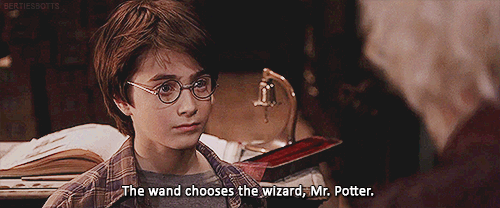Bargain Wands: Bad Economics or Ministry Subsidies?
In their song “The Economics of the Wizarding World Don’t Make Sense,” wizard rock band Harry and the Potters question how a wand could cost only seven Galleons and how Ollivander manages to stay in business, considering that most people only ever purchase one wand. While the band is poking fun at what appears to be an inconsistency in the text, I would like to take their qualm seriously for argument’s sake. This price discrepancy may be a simple error, or it could be the result of regulations made by the Ministry of Magic.
A wand is an absolute essential for every witch and wizard. Students cannot attend Hogwarts without one. Therefore, to make wands prohibitively expensive would be to exclude a portion of the population from partaking in the magic and magical education that is their birthright as members of the wizarding world who possess the ability to perform magic only with a wand. While wizards may have broomsticks of varying quality based on price, there can be no hierarchy of wands. Broomsticks, especially fancy racing broomsticks, are not a necessity. To deprive a wizard of a broomstick is not to seize their only means of transport; they can use Floo powder, the Knight Bus, or Apparition for example. They can borrow a broomstick when necessary. There is no substitute for a wand, and using the wrong wand can be ineffective at best and disastrous at worst.
Alternatively, the relatively low price of wands might be Ollivander’s own doing. He is an artisan with a deep passion for his craft. He holds wandlore sacred and takes his job very seriously. It is an absolute joy for him to find the right wand for every witch and wizard, and he relishes a challenge, such as the one Harry poses. Since the shop has been in business since 382 BC, perhaps Ollivander inherited an enormous family fortune and does not need to turn much of a profit to stay afloat. Or maybe his business is actually subsidized by the Ministry of Magic, allowing him to purchase materials for far lower than market value and only charge for labor. He seems to have no competition in Britain, so he knows he’ll always have customers.
Readers have long noted that Hogwarts does not seem to charge tuition and thus is likely to be either Ministry-funded or endowed by the founders with all it needs to remain open. A wand is a prerequisite to attend, so similar systems may be in place from the government, private interests, or some combination thereof to ensure that everyone has a wand. The wizarding world is far from perfect and does indeed have economic inequality – as evidenced by the Weasley’s inability to afford new robes and school supplies compared to the wealth of the Malfoys – but it’s possible that some steps have been taken to even the playing field and ease access to vital equipment.
So to answer Harry and the Potters’ question, “How does Ollivander stay in business?” Probably with assistance from a Ministry that is looking out for its citizens.



